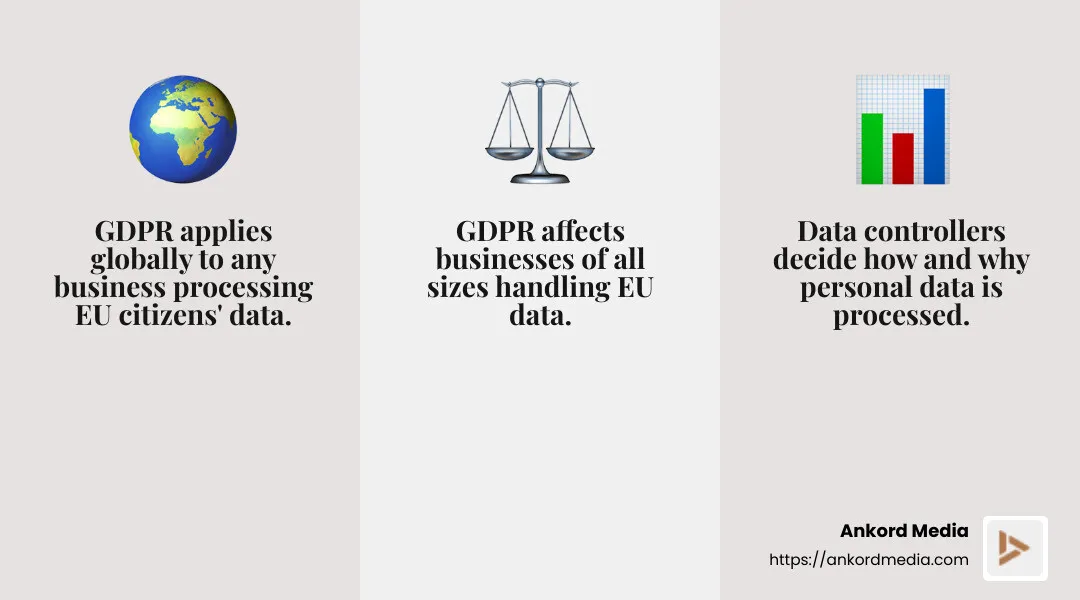GDPR Check-Up: Is Your Website Ready to Pass the Compliance Test?

Open uping GDPR: Why Your Website's Compliance Matters
GDPR, short for General Data Protection Regulation, is a critical set of data protection laws that apply to websites and businesses dealing with personal data in the European Union. Here's what you need to know upfront:
- What is GDPR?
- A regulation by the EU to protect personal data and privacy of individuals.
- Who does it apply to?
- Any organization that processes or intends to process the personal data of EU citizens.
- Key Principles:
- Lawfulness, fairness and transparency; purpose limitation; data minimization; accuracy; storage limitation; integrity and confidentiality; accountability.
Navigating GDPR compliance is crucial for businesses online, ensuring both trust and adherence to EU regulations. As Milan Kordestani, I've seen the implications of GDPR on digital strategies. With my background in creating digital experiences and my foundational insights into GDPR, I know how essential it is for companies to grasp these rules fully.

Key Principles of GDPR
When it comes to GDPR, three key principles stand out: transparency, integrity, and confidentiality. These principles are crucial for ensuring that personal data is handled responsibly and securely.
Transparency
Transparency is about being open and clear with individuals about how their data is being used. This means businesses must inform users about what data is collected, why it's collected, and how it will be used. For example, when you sign up for a newsletter, the website should clearly explain how your email address will be used and stored. This openness builds trust with users and ensures compliance with GDPR.

Integrity
Integrity focuses on maintaining the accuracy and reliability of personal data. Under GDPR, businesses must ensure that the data they collect is accurate and kept up-to-date. This means regularly checking and updating information to prevent errors. For instance, if a customer changes their address, the business should update their records promptly. Keeping data accurate not only helps in compliance but also improves customer satisfaction.
Confidentiality
Confidentiality is all about protecting personal data from unauthorized access. Businesses must implement appropriate security measures, like encryption and access controls, to safeguard data. Imagine a scenario where sensitive customer information is stored on a company's server. To comply with GDPR, the company must ensure that only authorized personnel have access to this information and that it's protected against breaches.
By adhering to these principles, businesses can create a secure environment that respects user privacy and aligns with GDPR requirements. This not only helps in avoiding hefty fines but also improves the company's reputation in the eyes of consumers.
Understanding these key principles is just the beginning. In the next section, we'll explore the scope and applicability of GDPR to help you determine if these regulations impact your business.
Scope and Applicability of GDPR
The GDPR has a broad scope that extends beyond the borders of the European Union, affecting many organizations worldwide. Understanding its applicability is crucial for businesses to determine their compliance obligations.
EU Citizens
The GDPR is designed to protect the personal data of EU citizens, regardless of where the data processing takes place. This means that even if a business is located outside of the EU, it must comply with GDPR if it handles the personal data of EU citizens. For instance, an online retailer based in the United States that sells products to customers in France must adhere to GDPR regulations.
This extraterritorial scope ensures that EU citizens' data is safeguarded globally, reinforcing the EU's commitment to data privacy.
Data Controllers
The regulation defines two main roles: data controllers and data processors. A data controller is an entity that determines the purposes and means of processing personal data. Essentially, it's the organization that decides "why" and "how" the data should be processed. For example, an e-commerce company collecting customer information for order processing acts as a data controller.
Data controllers have significant responsibilities under GDPR, including obtaining clear consent from individuals before collecting their data, ensuring data accuracy, and implementing robust security measures to protect the data.
Impact on Businesses
The GDPR applies to businesses of all sizes, from small startups to large multinational corporations, as long as they process personal data of EU citizens. This includes activities like collecting customer emails, tracking website visitors, or conducting market research.

By understanding the scope and applicability of GDPR, businesses can better assess their data handling practices and ensure they are compliant with the regulation. This not only helps in avoiding potential fines but also builds trust with consumers, who are becoming increasingly aware of their data privacy rights.
In the upcoming section, we'll dig into the specific compliance requirements under GDPR, including the roles of data protection officers and the importance of data processing agreements.
GDPR Compliance Requirements
To steer the complex landscape of GDPR compliance, businesses must pay close attention to certain key requirements. Two of the most critical components in this regard are the appointment of a Data Protection Officer (DPO) and the establishment of Data Processing Agreements (DPAs).
Data Protection Officer
A Data Protection Officer (DPO) plays a crucial role in ensuring that an organization complies with GDPR. Not every company needs a DPO, but those involved in large-scale processing of personal data, or handling special categories of data, must appoint one. The DPO acts as the guardian of data protection within the organization. They oversee data management practices, provide guidance on GDPR obligations, and serve as a point of contact for data subjects and supervisory authorities.
The role of a DPO is not just about ticking boxes. It's about embedding a culture of data privacy within the organization. This includes conducting regular audits, training staff, and ensuring data protection is considered in all business processes.
Data Processing Agreements
Data Processing Agreements (DPAs) are legally binding contracts between data controllers and data processors. These agreements outline the specifics of data processing activities, ensuring that both parties understand their responsibilities under GDPR.
A well-crafted DPA will cover:
- The scope and purpose of data processing: Clearly stating why the data is being processed and what it will be used for.
- Security measures: Detailing the technical and organizational measures in place to protect personal data.
- Data retention and deletion policies: Specifying how long data will be kept and the procedures for its deletion once it's no longer needed.
- Sub-processor agreements: Ensuring that any third-party processors also comply with GDPR standards.
By having robust DPAs in place, organizations can mitigate risks and demonstrate their commitment to data protection.
Why It Matters
Complying with these GDPR requirements not only helps businesses avoid hefty fines but also builds trust with customers. When data breaches are increasingly common, showing that you take data protection seriously can set you apart from competitors.
In the next section, we'll explore the penalties and enforcement mechanisms under GDPR, shedding light on what happens if compliance requirements are not met.
Penalties and Enforcement
When it comes to GDPR, ignoring compliance is not an option. The regulation has teeth, and the fines can be eye-watering. Let's break down what you need to know about the penalties and enforcement.
Fines and Penalties
GDPR imposes strict penalties for non-compliance, with fines that can reach up to €20 million or 4% of a company's global annual revenue, whichever is higher. This isn't just a theoretical threat—it's already happened. For instance, Google faced a €50 million fine for not adequately informing users about how their data was being collected and used, and for lacking proper consent mechanisms .
The fines are divided into two tiers:
- Lower Tier: Up to €10 million or 2% of worldwide turnover for less severe breaches, such as failing to maintain records or not notifying authorities of a data breach.
- Higher Tier: Up to €20 million or 4% of worldwide turnover for serious breaches, like violating the core principles of data processing or ignoring data subjects' rights.
European Data Protection Board
The European Data Protection Board (EDPB) plays a crucial role in ensuring consistent application of GDPR across the EU. This body comprises representatives from national data protection authorities and works to harmonize data protection laws among member states.
The EDPB issues guidelines, recommendations, and best practices to help businesses interpret and implement GDPR. They also mediate disputes between national authorities, ensuring that enforcement actions are fair and consistent throughout Europe.
Enforcement in Action
Enforcement is not just about fines. Regulators can issue warnings, demand audits, and even restrict data processing activities until compliance is achieved. In the UK, for example, the Information Commissioner's Office (ICO) has issued "notices of intent" to major companies like British Airways and Marriott for GDPR breaches, signaling potential hefty fines (source).
Why It Matters
Understanding the penalties and enforcement mechanisms of GDPR is vital for any business handling EU citizens' data. Not only does compliance protect you from significant financial penalties, but it also builds trust with your customers. In an era where data privacy is paramount, demonstrating a commitment to protecting personal information can be a competitive advantage.
In the next section, we'll tackle some frequently asked questions about GDPR, providing clarity on common concerns and misconceptions.
Frequently Asked Questions about GDPR
What is GDPR in simple terms?
The General Data Protection Regulation (GDPR) is like a rulebook for handling personal information. It's a law created by the European Union to protect people's data privacy. Simply put, it sets guidelines for how companies can collect, process, and store personal data. The goal is to give individuals more control over their data and ensure companies handle it responsibly.
Does GDPR apply to the US?
Yes, GDPR can apply to companies in the US. This is due to its extraterritorial scope. If a US company offers goods or services to people in the EU or monitors their behavior, it must comply with GDPR. This means that even if a business is based outside the EU, it may still need to follow these rules if it interacts with EU residents.
What are the 7 main principles of GDPR?
The GDPR is built on seven key principles that guide how personal data should be handled:
- Lawfulness, Fairness, and Transparency: Data processing must be legal, fair, and clear to the individual.
- Purpose Limitation: Data should only be collected for specific, legitimate purposes and not used beyond those.
- Data Minimization: Only the minimum amount of data necessary for the purpose should be collected.
- Accuracy: Personal data must be kept accurate and up to date.
- Storage Limitation: Data should not be stored longer than necessary for its intended purpose.
- Integrity and Confidentiality: Data must be secured against unauthorized access and accidental loss.
- Accountability: Organizations must take responsibility for complying with GDPR and be able to demonstrate their compliance.
These principles ensure that data is handled with care and respect, protecting individuals' privacy and rights. In the next section, we'll explore how these principles translate into practical compliance measures for businesses.
Conclusion
At Ankord Media, we understand that navigating the complex landscape of GDPR compliance is crucial for businesses aiming to build trust and maintain a strong brand reputation. Our expertise in strategic branding and crafting impactful digital experiences positions us uniquely to help you not only meet but exceed these regulatory requirements.
GDPR is not just a set of rules; it's an opportunity to improve your data management practices and foster authentic connections with your customers. By integrating GDPR principles into your business processes, you protect your clients' personal data and demonstrate your commitment to transparency and integrity.
We partner with visionary clients who are ready to accept this change and leverage it for growth. Our approach is to fuse cutting-edge design with robust data protection strategies, ensuring your brand's digital presence is both compliant and compelling.
Ready to transform your compliance challenges into a competitive advantage? Find how Ankord Media can support your journey to GDPR compliance and lift your brand to new heights. Together, we can turn bold visions into tangible success, ensuring your digital experiences are not only impactful but also secure and trustworthy.


